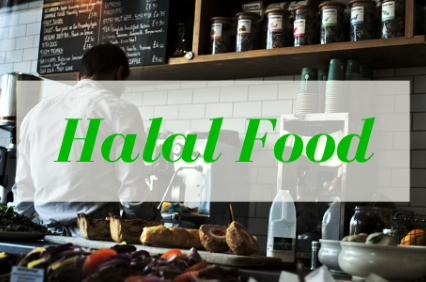Halal food are all the food that is permissible to eat according to the teachings of Islam. Islam is not only a religion, it is a way of life with protocols, rules and manners governing every facet of life. Since food is an important part of daily life, food laws carry a special significance.
Muslims are expected to eat for survival, to maintain good health and not to live for eating. They eat to maintain a strong and healthy physique in order to be able to contribute their knowledge and effort for the welfare of the society. Muslims are supposed to make an effort to obtain the best quality nutritionally.
In Islam, eating is considered to be a matter of worship of God like prayer, fasting, alms-giving and other religious activities. In general every food is considered halal in Islam unless it is specially prohibited by the Qur’an or the Hadith. Halal foods are those that are:
- Free from any component that Muslims are prohibited from consuming according to Islamic law (Shariah).
- Processed, made, produced, manufactured and/or stored using utensils, equipment and/or machinery that have been cleansed according to Islamic law.
- In the course of preparation, processing, transportation or storage had not been in direct contact with any food that fails to satisfy above requirements.
“Halal is clear and the Haram (unlawful) is clear. Between the two there are doubtful matters concerning which people do not know. One who avoids them in order to safeguard his deen (religion) and his honour are safe, while if someone indulges in it, he may be indulging in the unlawful……”
Sahih al-Bukhari
General Qur’anic guidance dictates that all foods are halal except those that are specifically mentioned as Haram (unlawful or prohibited). The Qur’an reads:
“O ye who believes! Eat of the good things wherewith we have provided you, and render thanks to Allah, if it is He whom ye worship.”
Chapter II, Verse 172
The unlawful foods are specifically mentioned in the Qur’an, in the following verses:
“He hath forbidden you only carrion, and blood, and swine flesh, and that on which hath been invoked any other name besides Allah’s……..”
Chapter II, Verse 173
“Forbidden unto you (for food) are: carrion and blood and swine flesh, and that on which hath been invoked the name other than Allah, and the strangled, and the dead through beating, and the dead through falling from a height, and that which hath been gored to death, and the devoured of wild beasts, saving that which ye make lawful (by slaughter) and that which hath been immolated to idols and that ye swear by the divining arrows. This is an abomination….”
Chapter V, Verse 3
Under the Islamic Law, all sources of food are lawful except the following sources, including their products and derivatives which are considered unlawful:
1) Food of Animal Origin
(a) Pigs and boars.
(b) Dogs, snakes and monkeys.
(c) Carnivorous animals with claws and fangs such as lions, tigers, bears and other similar animals.
(d) Birds of prey with claws such as eagles, vultures, and other similar birds.
(e) Pests such as rats, centipedes, scorpions and other similar animals.
(f) Animals forbidden to be killed in Islam i.e., ants, bees and woodpecker birds.
(g) Animals which are considered repulsive generally like lice, flies, maggots and other similar animals.
(h) Animals that live both on land and in water such as frogs, crocodiles and other similar animals.
(i) Mules and domestic donkeys.
(j) All poisonous and hazardous aquatic animals.
(k) Any other animals not slaughtered according to Islamic Law.
(l) Blood.
The aforementioned animals excluding fish and locusts will only be considered halal when they are slaughtered according to the following guidelines:
• The slaughter man must be a Muslim
• Prior to slaughter, the slaughter man must invoke the name of Allah upon the animal to be slaughtered by reciting “Bismillahi Allahu Akbar” or at the very least recite “Bismillah”
• He must immediately slaughter the animal after the recital without any significant delay
• His knife must be extremely sharp in order that the slaughter may be conducted efficiently and easily and the animal suffers minimal agony
• He must sever the following arteries:
• Trachea (windpipe), Oesophagus (gullet), both Jugular Veins
• If it is not possible for the slaughter man to cut all four arteries due to whatever reason then he must sever at least three in order to render the meat halal.
• He must conduct the slaughter manually (i.e. by hand) and swiftly. The knife must not be lifted before the cut is complete and the cut must be below the Adam’s apple
Meat is the most strictly regulated of the food groups. Not only are blood, pork, and the meat of dead animals or those immolated to other than Allah strongly prohibited, it is also required that the halal animals be slaughtered while pronouncing the name of Allah at the time of slaughter.
“Eat of that over which the name of Allah hath been mentioned, if ye are believers in his revelations”
Chapter VI, Verse 118
“And eat not of that whereon Allah’s name hath not been mentioned, for lo! It is abomination. Lo! The devils do inspire their friends to contend with you. But if ye obey them, ye will be in truth idolaters”.
Chapter VI, Verse 121
2) Food of Plant Origin
Intoxicating and hazardous plants except where the toxin or hazard can be eliminated during processing.
3) Drink
(a) Alcoholic drinks.
(b) All forms of intoxicating and hazardous drinks.
Consumption of alcohol and other intoxicants is prohibited according to the following guidance:
“O ye who believe! Intoxicants and games of chance, and idols and divining arrows are an abomination of Satan’s handiwork. Leave it aside in order that ye may succeed.”
Chapter V, Verse 9
4) Food Additives
All food additives derived from Items listed above

